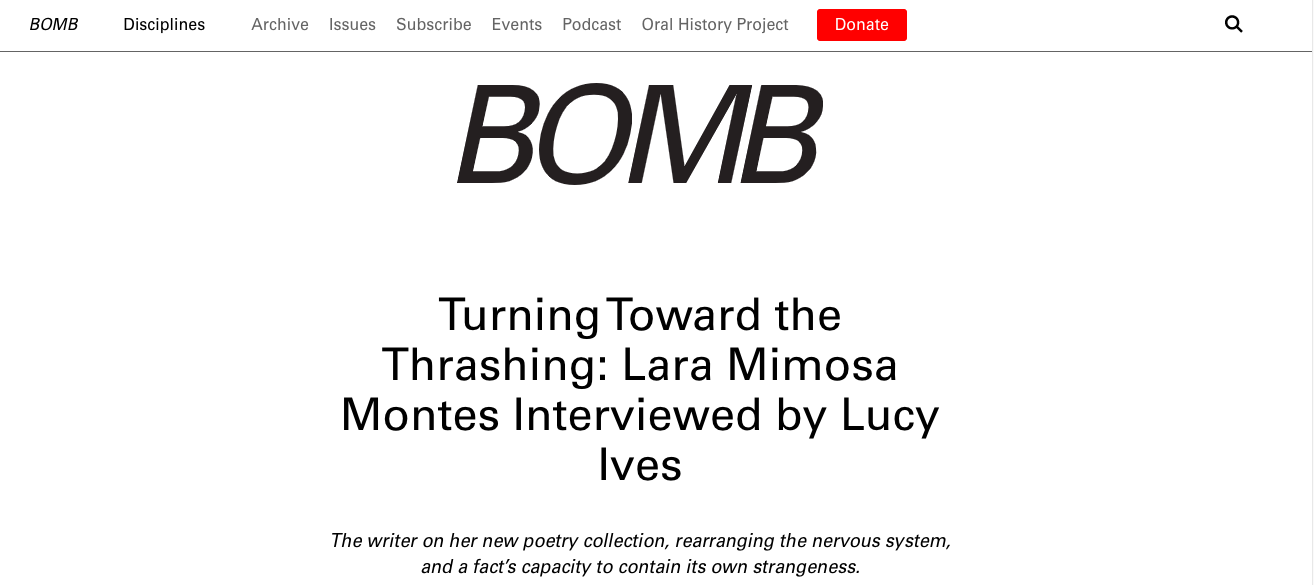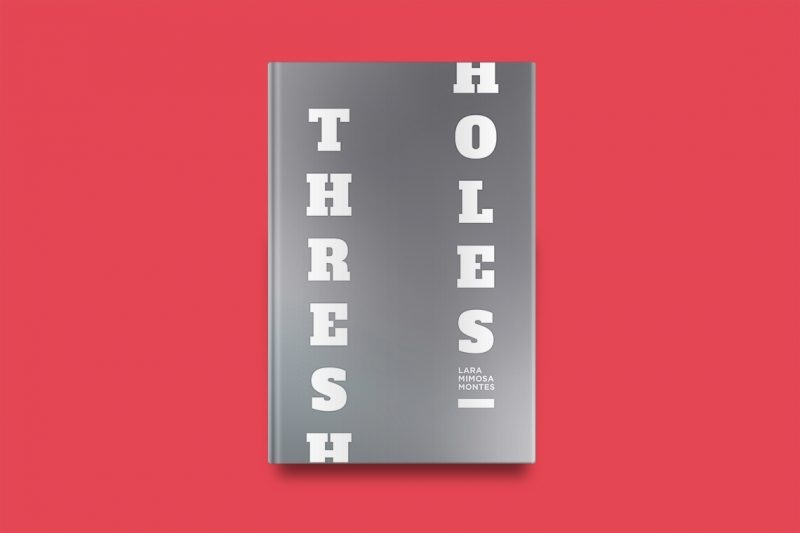TURNING TOWARD THE THRASHING: LARA MIMOSA MONTES INTERVIEWED BY LUCY IVES
The writer on her new poetry collection, rearranging the nervous system, and a fact’s capacity to contain its own strangeness.
My first memory of spending time with Lara Mimosa Montes takes place in an old apartment in Ridgewood, New York. This was eight or nine years ago, when Lara and I both resided in the city and both of us were PhD students, at CUNY and NYU, respectively. It was a small party and most of my recollection from this occasion is of Lara, who was so striking and intelligent and kind. Our friendship has outlasted that party and context, including the doctoral programs (from which I am very glad to say we both graduated). These days Lara spends most of her time in Minneapolis, while I’m in rural Vermont. But we each return to New York—where, incidentally, we were both born—with some frequency and also visit each other where we live now. It’s lucky when you find a friendship like this, one that seems to transcend life changes and the limitations of geography.
This interview was conducted over email in October of 2019. Lara sent me the then-manuscript of her beautiful now-book THRESHOLES (Coffee House Press), a work of serial prose that functions like an essay, a poem, a refrain, or even a film. With its aphoristic lines and longer paragraphs, she is constructing a sort of anti-monument: to events in her own life that resist description; to the past and present of the Bronx; to contemporary artists and writers and friendships; in the spirit of the artist Gordon Matta-Clark; against death but not without deep engagement with loss. Here we spoke (wrote) about the weird porosity and interdependence of fiction and real life, so called, among other things. It’s something special for me to share this conversation with readers of BOMB. I feel I’m extending a small part of my own more private or personal self. Lara brings that out.
—Lucy Ives
Lucy Ives
Early on in THRESHOLES, you introduce the notion of “a fictional character with actual feelings,” an idea that would imply that surrogacy is important to the process of storytelling (or, perhaps, the kind of storytelling that interests you). As the book is a work of nonfiction that foregrounds form, I wondered if you could expand on this idea of mixing the fictional and the actual in writing. Is a fictional character with actual feelings a surrogate for an “actual” person?
Lara Mimosa Montes
Surrogacy—that word in itself contains so much; it’s fraught with maternal associations and gestures, like the kind that involve the willingness to embody, at least temporarily and perhaps on behalf of another person(s), another body or alternative subjectivity. Another trope associated with surrogacy is possession: it is not “I” who speaks in this work, but the stranger whom I carry. If THRESHOLES contains elements that strike a reader as a mix of “the fictional” and “the actual,” perhaps it is because I often felt that I was not “the author” so much as the surrogate for the work. That anxiety about “who is speaking” at any given moment in the text appears throughout the book, and sometimes I experienced this anxiety as a philosophical problem, at other times, a spiritual one. I thought that when I finished the book, I would be done with that question, but I still feel like I am standing in someone else’s shadow.
In this way, the figure of the surrogate also invokes the understudy and the stand-in, as well as the double. So in order to write about the various displacements I had been feeling, these categories of “fiction” and “actual” end up becoming pretty porous. Some months ago, for example, my boyfriend, Ernie, and I were watching a VHS copy of David Cronenberg’s Videodrome, and in the scene we were watching, where James Woods puts a VHS into the VCR, it was the same time in the movie, 9:44 PM, as it was in the world. I don’t understand how an author becomes a character, or when a carefully coordinated set of truths becomes literature. I just know that it happens all the goddamn time.
LI
That sounds uncanny. Could you say more about how THRESHOLES deals with the act of returning to a place which might once have been familiar?
LMM
The title THRESHOLES comes from a work by the artist Gordon Matta-Clark, part of his series Bronx Floors. After I spent some time with this series at the Bronx Museum’s Anarchitect exhibition and then read his Collected Writings, I felt that his understanding of space, line, and form resonated with my general interest in memory, repetition, the allure of substitution. I have always maintained a belief that the uncanny is all around us, so when I read Matta-Clark’s notecards alongside his works, works which I realized also double as the documentation of the work, I wanted to avail myself in my own work of a fact’s capacity to contain its own strangeness. For example, threshole is to threshold as Myrtle Gordon is to Gena Rowlands. Do you remember the multiple-choice analogies section on certain standardized tests from when you were a child? Because I do. I suffered a great deal to understand and then narrate what one unknown quantity had to do with another.
The story of how one object or set of objects may or may not correspond with another is seldom a matter of truth, but instead a matter of perspective; however, were I to rewrite this sentence, I might just as easily consider: The story of how one object or set of objects may or may not relate to another falls somewhere between truth and fiction. In my writing, I don’t distinguish much between my capacity as an author to imagine and invent the relationships between things (ie. facts, objects, people) and my capacity to experience them “in real life.” I have also never forgotten our phone conversation shortly after your novel Impossible Views of the World came out where you said something to me along the lines of “Some truths are so horrible, they can only be rendered as fiction.”
LI
That was maybe a little dramatic of me! I do want to say that now, when I read the coverage of the various Sackler museum wings and stairs, etc., that are having that family name removed from them, I wonder if I couldn’t have done even more in my novel to describe the donor class. Although I think I was talking about something more personal when I said that to you.
But to circle back to the question I just posed, I wonder if you ever find that you notice something about your real life that you didn’t notice previously, having written something fictional. I know that’s a bit broad, but something in your mention of standardized-test analogies makes me think that we probably agree that “real life” and “fiction” are not opposed to each other—and are perhaps both the products of the same sorts of world-making processes. But maybe there’s a difference between them, in that they can be mutually illuminating in some ways. What do you think?
LMM
I know it’s dramatic—that’s why it stayed with me. The truth is horrible, and I don’t always want to write toward it. If not the truth, then what? What am I writing toward? In THRESHOLES, I tried to be okay with this not-knowing. The not-knowing takes place somewhere between the not-yet-written and the not-yet-lived. In this way my writing “practice” feels pretty entropic. Recently, I confessed to someone that I am made nervous by my imagination; the problem with my imagination is not that I love to speculate (I do), but that I also like to test how real and realizable certain fictions are, and then, out of some world-making desire or, more likely, some self-destructive impulse, I end up writing about the outcomes of these thought experiments in real time, as they are taking place, materializing and changing in the moment of writing. I feel a bit too close to my work, and not because I write “about” myself but because I haphazardly subject myself to my own thought experiments and all too willingly participate in my own fictions, all of which have real effects on my actual life. It’s pretty confusing, so I’m not sure if I would describe the process as one of illumination. That might be too optimistic.
LI
Could you describe one or two of these thought experiments? Do they, for example, begin with a premise/hypothesis that you then “test” or watch unfold? I know you may not have meant the term “thought experiment” totally literally, but since film seems to be so much a part of the work you do, I wondered if there might not be something cinematic about this process of creation/self-testing.
LMM
One of the thought experiments I pursued while writing THRESHOLES was “speak from a subject position that is no longer.” In order to address that task, I had to think and read a lot about change, transformation. I reread books by writers like Mei-mei Berssenbrugge, Melissa Buzzeo, and Clarice Lispector, in order to reflect upon the question, “What happens to a person when they realize they are turning into something else?” I didn’t reread Kafka, though. I was very intentional about reading mainly women during this time, because the kinds of change I had in mind were also inseparable from my interest in the unspeakable. So in approaching the prompt to speak from a subject position that was no longer, I might follow up with: How do you experience your own disappearance? Can this be written about and how?
Since this process is not one that I can always document, in part because these processes are based in somatic experiences which do not always lend themselves to language, in some instances it was just preferable to watch a movie. Plus, I like films not so much because they are stealth fictions, but because I really enjoy watching an actor work through a scene, and I sometimes think of a scene as a given director or screenwriter’s “thought experiment.” I also imagine certain actors, in order to play a part, must invent their own thought experiments. I can’t be the only person who wonders how in the world Elizabeth Berkley got her mind right to play Nomi Malone in Showgirls.
Anyway, you can imagine that certain questions or thought experiments, cinematic or not, are seldom compatible with everyday life. For example, the task of imagining and exploring “the subject position that is no longer” is just not compatible with Thanksgiving. It’s really hard for me to live in the real world most of the time. I just… prefer not to.
LI
There’s an amazing moment in THRESHOLES when the speaker begins to reflect, in response to another person’s bizarre generalization, an off-hand remark about reality, so called: “I took a few moments to imagine the various ways one might respond: Yes, yes, I know how reality works, so no need for the preamble! Or: No, I don’t know. Please, tell me more. Or maybe I would answer a question with a question: Well, how do you know how reality works?”
I smiled deeply, reading this, but I also felt sad. The instant at which we recognize that someone we know believes that they know “how reality [really] works” can be one of disappointment and even loneliness or isolation. At the same time, I can’t help seeing THRESHOLES as an exploration of the constructed nature of reality, which is to say, of “how reality [really] works.” I wonder if the absurd (a.k.a. absurdity) is an important category or affective register for you—and, if so, how you understand it and, specifically, the way it operates in the contemporary United States. Can (shared) recognition of absurdity bring relief? Might it be a style of knowledge, even?
LMM
I’ve never considered that category, the absurd, in relation to my work too much, because I tend to associate it with Dada, and things like Salvador Dalí and his pet ocelot, Babou. But Beckett is absurd. So is the work of Sophie Calle, and I love her writing. I’m so happy that The Address Book and Exquisite Pain exist, so I respect her a lot. But the way that the United States is absurd is so dark and wrapped up in the political. Were a writer to explore the absurd in relation to American tendencies and the like, I imagine she’d have to be pretty versed in satire to some degree, no?
LI
Yes. Probably so well versed in satire that the critique side of things would turn into some sort of weird celebration! Which is just to say that I’m not that sure about the efficacy of satire these days. I think I’m more interested in your thought experiments at this point. Or something you mentioned earlier, “stealth fictions.” One last trio of questions for you: You came close to saying this a moment before, and I meant to press you on it: Is there a definition of a “threshole”? Also, what does the writing of thresholes do to the figure of the author? Does this practice refashion the author in some way?
LMM
Threshole: noun. A point of cross-over, portage, or a violent passing through. It’s a portmanteau. Thresh is a variant of thrash + hole. Threshole is also a double or doppelganger of threshold, “the magnitude or intensity that must be exceeded for a certain reaction, phenomenon, result, or condition to occur or be manifested,” according to the dictionary.
Thresholes also refers to the form. Rather than write a crown of sonnets, I wrote a book of thresholes. I imagine there are readers out there who will think this kind of poetry is sloppy or “anti-form,” but how can it be? What is madness without form? There are many antecedents to this kind of writing like Roland Barthes by Roland Barthes, Clarice Lispector’s Água Viva, and of course your book, The Hermit. The nature of writing thresholes requires an openness to permutation, obsession, cellular reconfiguration, psychic transport, phenomena that happen abruptly and alter the grammar, the time-fabric of the work. So while I pride myself on being an empirical person, something about this process definitely “undid” me. My nervous system, my diurnal patterns, my writing practice—everything had to rearrange itself in order to do this work.
I am obviously still struggling to describe “the work.” I’m not talking exclusively about the book anymore, but the process of becoming flesh. I think there are many writers for whom “the body” is an abstraction, but in my work, the body is never an abstraction or stand-in for something else. I’m also not sure if the level of somatic awareness I had to cultivate in order to write this book is something that can be “taught” so much as given over to. That was often how I felt writing this, given over to something else, often without my permission. To experience this given-over-ness, I had to let go of this fantasy of “consent.” So, for better or worse, I end up turning toward the thrashing instead, an activity which is as familiar to me as it is violent. Am I writing this as a woman, or am I writing this as someone who has experienced a certain kind of violence, and is that violence inseparable from my knowing myself as a woman, and as a writer? I don’t believe this question is a hole we need to dig ourselves out of just yet.

On site.

Photo of Lara Mimosa Montes by Rijard Bergeron.

THRESHOLES.